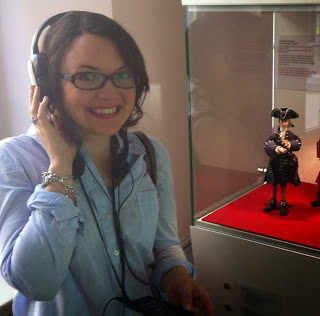Volunteering as an act of self-care
 Today, I’m inviting Rebecca Geoffroy-Schwinden to share her perspective on self-care in academia. Rebecca is a musicologist who researches sound as politics since the eighteenth century, particularly musicians during the French Revolution. Her recent work has been published in Studies in Eighteenth-Century Culture, Kinetophone, and Provoke!. Rebecca will receive her Ph.D. in musicology from Duke University this May and will begin a position as Assistant Professor of Music History at the University of North Texas in August. You can follow her on Twitter @BeccaSchwinRoy.
Today, I’m inviting Rebecca Geoffroy-Schwinden to share her perspective on self-care in academia. Rebecca is a musicologist who researches sound as politics since the eighteenth century, particularly musicians during the French Revolution. Her recent work has been published in Studies in Eighteenth-Century Culture, Kinetophone, and Provoke!. Rebecca will receive her Ph.D. in musicology from Duke University this May and will begin a position as Assistant Professor of Music History at the University of North Texas in August. You can follow her on Twitter @BeccaSchwinRoy.
I circulated my dissertation to the dissertation committee precisely five hours before I sat down to write this post. Before I venture too far into a post-grad school frame of mind, I want to take this opportunity to speak as my Ph.D. candidate self and to share one way that I took care of that self during my last year of writing, which coincided with my first year on the dreaded academic job market.
Last August, I began to prepare job applications. I knew the 2014–2015 academic year held potential for complete emotional deflation, despite the fact that I had mercifully been able to find funding from my university’s graduate school for one more year of writing. Dissertation problems, when you’re in the middle of them, can seem like soul-crushing catastrophes. It is a lonely process and oftentimes human interaction mostly comes in the form of critical feedback on hours of painstaking work. Compounded with job market rejections, the final year of dissertating can be downright devastating. The devastation, at least for me, came from a search for purpose: the “real world” insists that Ph.D.s in the arts and humanities are increasingly useless, while the job market implies that you aren’t welcome there either. At a time when you should be celebrating that the finish line is in sight, you’re also anxiously contemplating the possibility that there might not be anything there to welcome you upon arrival.
I decided to pre-empt these scary feelings, which I had already projected and mentally lived before the year even began. I started volunteering a few hours per week: two hours I walked dogs at the local animal shelter and three hours I tutored an adult to improve literacy skills. Although I worried about taking time away from the writing process, I knew that I had to take at least 5 hours of time off per week anyway. I also knew that without a sense of purpose that paid off immediately, I might not be able to finish the dissertation at all. Volunteering gave me a sense of utility, a break from the dissertation, and a living connection that often becomes lost during that long final push to finish. It also forced me to put dissertation problems in perspective. There are animals without homes and adults who can’t read. They needed me to show up twice per week. And feeling like I mattered saved me from succumbing to a negative state of mind.
Bill Clinton has been famously praised and ridiculed for describing his philanthropic work as “selfish.” But during the past year I could not help but feel the power of mutually beneficial service. For five hours per week I felt that my existence in the world made a difference to living beings. Humans need to feel needed. During the 2013–2014 academic year, my teaching certainly filled this void. I realize many Ph.D. candidates write their dissertations under stressful time frames that include children and other jobs. This self-care suggestion is certainly not for those who are already stretched to the brink. However, for those who only have the dissertation to face every morning, finding a cause close to your heart and using that as a productive outlet during the dissertation stage can provide a valuable source of self-care.
